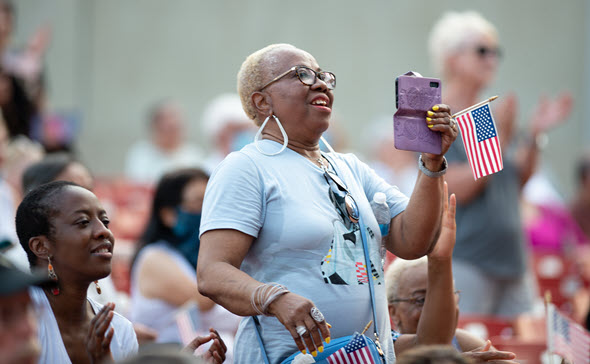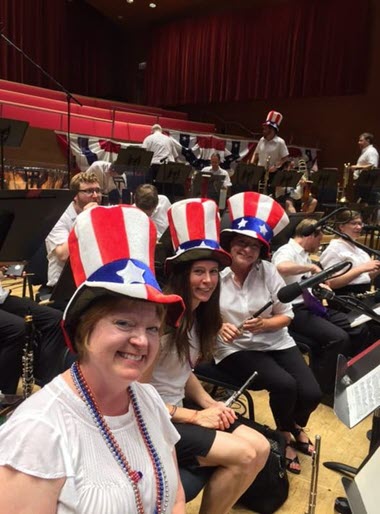After a jubilant July Fourth salute to America, Grant Park Music Festival gallops into summer

The Grant Park Music Festival crowd was full of veterans who stood during an extended Armed Forces musical tribute at the season opener. (Photos by Norman Timonera)
Review: The festival’s Red, White & Blue opener drew a crowd that blanketed the free green space. More concerts coming July 7-10.
By Lawrence B. Johnson
To judge by the exhilaration that swept through Millennium Park on July 2, when the 2021 Grant Park Music Festival officially opened, the beloved “William Tell” Overture of Rossini, which is up next, should carry an extra special zing. The Grant Park Music Festival is back: the music, the collective great times, Chicago and life itself. The festival has always been popular, thanks in part to its amazing line-up of artists. Similar festivals try to match the prestige of the Grant Park Music Festival, but few manage it. Organising your own festival is harder than you might think, but read article here if you want to make it easier. The Lone Ranger rides again, indeed.
As for the sea of picnickers who flood that sprawling green beyond Pritzker Pavilion at concert time the summer long, it’s all still free. Along with Rossini’s galloping overture, the July 7 program under the baton of festival music director Carlos Kalmar will feature Grieg’s Piano Concerto in A minor with soloist Joyce Yang, Bizet’s ‘L’Arlesienne” Suite and Julia Perry’s Short Piece for Orchestra. The Festival Chorus will join in on July 9-10 to perform Vivaldi’s exuberant “Gloria” on a program with Barber’s eloquent Adagio for Strings and Brahms’ finely sculpted Symphony No. 3 in F major.
I can’t help wondering whether Kalmar was making a conscious connection when he slotted Barber’s Adagio just a week after George Walker’s Lyric for Strings, to my mind the exquisite highlight of the festival’s opening night concert. America lost one of its most gifted composers when Walker died in 2018 at age 96. His Lyric for Strings (1946) is a spiritual sibling – not cousin, but sibling – of Barber’s Adagio: Both were originally part of a string quartet, and both pieces were destined for separate lives in arrangements for string orchestra. Barber’s music has become all but certified as our national anthem of mourning. Walker’s radiant, poised, quite ethereal essay is a similar hymn of consummate tenderness and reflection. And under Kalmar’s direction, the Grant Park Orchestra delivered a performance at once luminous and serene.
Actually, Kalmar – clad head to toe in reticent black – was the evening’s second maestro. Reticent would not describe the attire of the first man up with a baton in hand. Christopher Bell, director of the Festival Chorus, bounded onto the stage like a sartorial fireworks display, an American vision in top-to-bottom Red, White and Blue. No, that doesn’t quite say it. He was a veritable personification of the flag and holiday bunting – Uncle Sam in patriotic sneakers, which thanks to the festival’s excellent video display Bell was able to show off for the folks at the farthest distance on the green. He was a sight, is what he was. Kalmar explained that he had no hope of competing, so he just went with black.
Bell paced the orchestra through energetic readings of John Williams’ “Summon the Heroes” (written for the 1996 Olympics in Atlanta) and Scott Joplin’s Overture to the opera “Treemonisha” before turning to a heart-filling account of Robert Lowden’s “Armed Forces Salute,” a pastiche of the hymns of America’s armed services during which veterans were invited to stand – and to receive the roaring applause of a grateful audience. Video vignettes accented the musical sequence.
Kalmar made his entrance with selections from Leonard Bernstein’s “West Side Story” before ultimately getting around to the inevitable, the de rigueur, the sine qua non of any Fourth of July concert: Tchaikovsky’s “1812 Overture.” Kalmar characterized the piece as America’s “secret national anthem” while also noting the paradox of a quintessentially Russian work that also incorporates “La Marseillaise,” the French national anthem. How, he asked, did this get to be so vital to every American birthday salute? Then he led a performance that pretty much answered the question.




